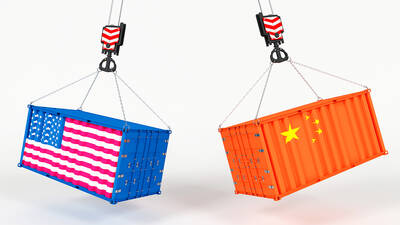A: K-pop supergroup Bigbang’s frontman G-Dragon is set to hold three concerts at the Taipei Arena starting tonight.
B: His new hit “Too Bad” has gone viral lately. During my visit to Haidilao hotpot not long ago, the chef even grooved to this song while performing a noodle dance.
A: Actually, Bigbang member Dae-sung just staged a show in Taiwan last month as well.

Photo: Liberty Times 照片:自由時報
B: Plus, another member, Tae-yang, also held a concert here last December.
A: I wonder when the three members will rock Taiwan as a group again.
A: Bigbang隊長、韓流天王G-Dragon權志龍今晚起將在台北小巨蛋嗨唱3場。
B: G-Dragon的新歌《Too Bad》爆紅!連我去海底撈用餐時,廚師表演拉麵秀都在跳這首歌。
A: Bigbang成員大聲6月才剛來台開唱。
B: 該團成員太陽去年12月也曾來台開唱。
A: 不知三位團員何時才能合體來台巡演?
(By Eddy Chang, Taipei Times/台北時報張迪)

Returning to the White House with unprecedented economic weaponry, US President Donald Trump has launched a comprehensive tariff offensive that has sent shockwaves through international markets. On April 2, Trump announced his “reciprocal tariff” strategy, aimed at punishing trading partners who sell more to the US than they buy in return. Central to his policy is the disputed view that such trade deficits harm the US economy. While Trump later suspended most of the tariffs to allow time for negotiations, some still went into effect, and the others remain a looming economic threat. Tariffs, essentially taxes imposed on imported goods, raise

★ Bilingual Story is a fictionalized account. 雙語故事部分內容純屬虛構。 Wu Gang bent low, his axe heavy in his hands. Sweat rolled down his back. He struck the osmanthus tree. The wound closed again. He paused to breathe. He admired the branches, glowing against black silence of space. He smelled the blossoms, sweet but fleeting. Long ago, he drank deep of wine. He chased fast pleasures. He sought the potion of immortality. Not to escape death, but to merge with the Dao. Yet he hurried. He demanded the quick path. The Jade Emperor saw his heart. Desire without patience. So

A: US singer Taylor Swift finally released her 12th album, titled “The Life of a Showgirl,” on Oct. 3. B: The pop diva’s dominating the Billboard charts once again. A: Earlier this year, she also successfully bought back the master recordings to her first six albums. B: And the good news keeps coming, as she and NFL superstar Travis Kelce announced their engagement not long ago. A: Wow! It must be her lucky year. A: 美國歌手泰勒絲10月3日終於推出第12張專輯︰《The Life of a Showgirl》。 B: 流行天后又再次稱霸《告示牌》排行榜。 A: 今年稍早時,她還成功買回了她自己前6張專輯的錄音母帶。 B: 而喜事連連,她和美式足球巨星凱爾西近日宣布他們訂婚了。 A: 哇今年真是她的幸運年! (By Eddy Chang, Taipei Times/台北時報張迪)

A: While Taylor Swift’s new album conquers the Billboard charts, Billboard Live Taipei is set to open next month. B: Isn’t that a Japanese “live house” of the same name with the magazine? A: Yup, and the live music club’s first Taiwanese branch can accommodate 300 guests. B: Who will be performing at the club’s opening show? A: Japanese singer Mika Nakashima will play four gigs over two nights. Wanna go to the club and watch her perform up-close? A: 天后泰勒絲的新專輯再度征服《告示牌》排行榜,告示牌音樂台北則預計將在下月開幕。 B: 那不是跟《告示牌》同名的日本現場音樂餐廳嗎? A: 對,這家連鎖餐廳的台灣首店約可容納300名觀眾! B: 開幕秀的表演者是誰? A: 是日本歌手中島美嘉,想近距離看她現場演出嗎? (By Eddy Chang,